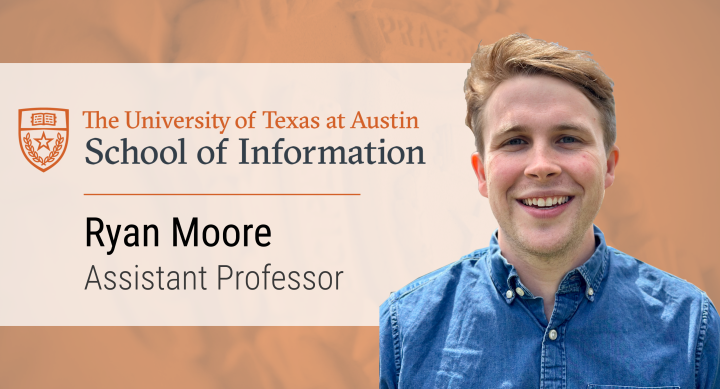
As classes resume this month, we welcome a new face to the University of Texas at Austin School of Information community: Assistant Professor Ryan Moore. Moore joins the iSchool from Stanford University, where he earned his PhD in Communication and most recently spent a year as a New Map of Life Fellow at the Stanford Center on Longevity.
While earning his doctorate, Moore came to focus on media literacy for older adults, who are at heightened risk of being exposed to various types of deception online, including financial scams, bogus health cures, and political hoaxes. He encountered an array of educational interventions aimed at addressing this problem, including everything from in-person courses to online games, but few focused on older adults.
“Intervention could be especially helpful for older adults, who may be new to certain online platforms that they're using for the first time, or may have had fewer opportunities to develop digital literacy compared to younger people that ‘grew up’ online,” Moore says. “But a big limitation that I saw in previous research, and in the efforts of organizations focusing on media literacy education, is that a lot of it is just really hard to scale.”
Moore’s dissertation research, conducted in partnership with Google’s Jigsaw research and development program and the Poynter Institute’s MediaWise digital literacy initiative, created brief 15- and 45-second educational videos. The videos taught skills like lateral reading – using additional browser tabs to conduct searches to verify information – and reverse image search to help identify deceptive content online. These videos were developed with the older adult audience in mind. Across several studies, effects of exposure to the videos were tracked via surveys, as well as by having some consenting participants download software that logged their web browsing activity for a period of time after viewing the videos. In one study, videos were shown to millions of older Americans via advertising campaigns on YouTube, where Moore gauged users’ comprehension of the ads via on-platform surveys.
“What I'm really excited about is that not only do these interventions help people in things that we typically measure in surveys – like in decision-making tasks that we give them or in comprehension questions that we ask – but we also saw that exposure to the videos, just one time, increased the likelihood that people applied things like reverse image search or lateral reading in their everyday web browsing,” Moore says. “We show that that translates into older adults, on average, after seeing our intervention, visiting higher-quality websites than before, compared to a control group.”
Moore earned his PhD in Stanford’s Department of Communication, where he characterizes his colleagues and mentors as highly attuned to emergent big-picture and socially-pressing questions around technology. He sees the same values as core to the iSchool at UT.
“I'm super excited to be joining the iSchool,” he says. “While academia is sometimes seen as slow-moving or slow to respond to what's going on in the real world, in my conversations with the faculty at the iSchool, and in learning about what students are working on there, they really seem to be on the cutting edge. That's an ethos that I feel passionate about.”
Moore anticipates becoming involved with the Texas Aging & Longevity Consortium on the Forty Acres, and he’s looking forward to being surrounded by a wide community of scholars with AI expertise at the iSchool. At Stanford, Moore was co-author on a study of people’s ability to recognize AI-generated images during the 2024 election, and he anticipates his research may develop further in the direction of AI.
“A question for me, and this is something I'm eager to work on in the coming years, is whether we need to rethink basic digital skills for the AI era,” he says. “Are things like reverse image search still useful in an era where more of those images are going to be generated by AI? Is lateral reading an evergreen skill when there's an increasing amount of AI-generated information on the web, particularly on search engines? I'm encouraged by the number of iSchool faculty and students who seem to also be interested in working on this.”
Another big draw of the iSchool, for Moore, is the opportunity to work with partners outside of academia. Just as his collaborations with Google and the Poynter Institute were crucial to his dissertation findings, he has recently been working with partners in the fraud prevention space to study a vast collection of millions of spam and scam robocall pitches. There, he has leveraged large language models to analyze the enormous archive.
“I've worked with nonprofit organizations and corporate partners who have really elevated the type of research that I can do – in bringing their expertise to the studies and in the potential for dissemination out into the real world,” Moore says. “I appreciate having that two-way street between me as an academic researcher and the practitioners that are working in the space that I seek to study.”
In the iSchool and its environs, Moore sees a landscape full of opportunities to seek out new partners, both in and outside of academia. “I feel I’ll be able to continue to not only pursue my work, but to grow and evolve it – in ways I’m eager to explore as I build new connections, both in the iSchool and all around UT and the Austin community,” he says.